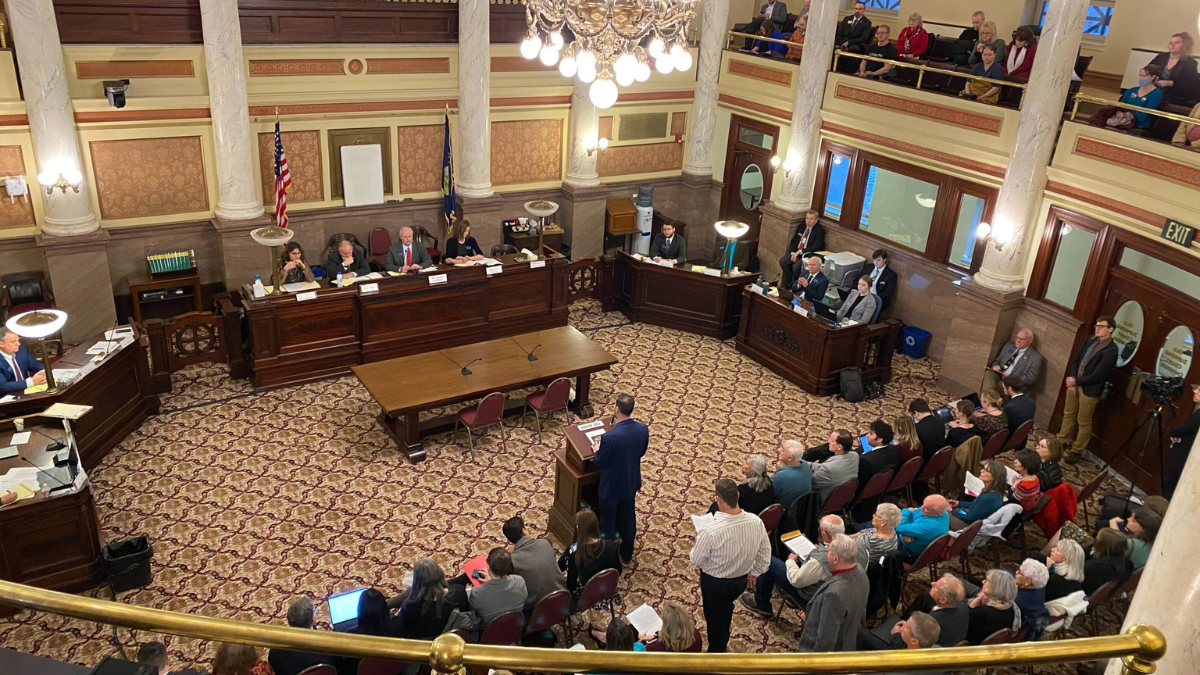Roughly 150 people gave passionate testimony Friday morning on Senate Bill 99, a proposal to ban gender-affirming care for transgender minors and restrict the use of public resources for medical and social transitions. After more than five hours of commentary, opponents outnumbered proponents by more than two-to-one.
SB 99, sponsored by Sen. John Fuller, R-Kalispell, echoes the lawmaker’s previous attempts in 2021 to restrict what LGBTQ advocates, medical providers and parents say are vital resources for young people experiencing gender dysphoria, including puberty blockers and hormone therapy for adolescents. Fuller’s two bills with similar goals failed to pass both chambers of the Republican-held Legislature last session.
The latest measure would go further than Fuller’s past bills, transgender advocates said Friday, by prohibiting public funds and facilities from supporting gender-affirming care, and its attempt to curb public employees from promoting social methods to recognize a young person’s gender identity, like clothing, hairstyles, names and pronouns. Those options, opponents said, can be life-saving for young people experiencing depression, anxiety and dysphoria because of an incongruence between their sex assigned at birth and their gender identity.
Fuller cast opponents’ concerns about invasion of privacy and legality as “red herrings” and described SB 99 as an attempt to protect children and adolescents from medical treatments and surgery, the ramifications of which he said they cannot fully comprehend.
“Health professionals take an oath to do no harm, and altering the physical appearance of a child without their [age of] majority consent is unconscionable,” Fuller said. “The state of Montana has the responsibility and the right to protect children from such abuse.”
Fuller was joined by about 45 proponents, including four activists from other states who said they regretted receiving gender-affirming medical care and surgery as adults, representatives of the national anti-LGBTQ policy groups the Family Research Council and the Heritage Foundation, and Montana residents who spoke against the social pressures they say young people face to identify as transgender or nonbinary. One proponent, Butch Barton of Three Forks, called it a “fad that is sweeping our country.”
Dozens of transgender Montanans, their family members and medical providers eviscerated those characterizations in later testimony, citing numerous anecdotes of the happiness and success transgender people experience after accessing social and medical affirmation as young people and adults.
“I go to school like any other kid. I do well in school. I play guitar, snowboard and play soccer. I’m just a regular kid. And I’m trans,” said 13-year-old Helena resident River Meury. “I’m not the monster under your metaphorical bed that the proponents would make all trans, non-binary and two spirit people out to be. No one has ever tried to make me this way. I haven’t been infected by a virus … It’s simply who I am. It’s a feeling deep in my heart and soul.”
Opponents of the bill said that surgery for transgender minors nationwide is rare and, in the case of genital-altering procedures, not happening at all in Montana. Their testimony also pointed to recommendations from the nation’s leading medical associations and research studies showing that transgender minors who are affirmed in their gender expression and have access to the medical care they seek are at a substantially lower risk of suicide.
Those statistics were reinforced in emotional stories opponents shared with the committee. In a letter read by a lobbyist on their behalf, two Missoula parents said using medications to delay their transgender son’s puberty “saved our son’s life” and gave them time to learn about his health care options.
“We’ve watched our once joyful and witty child come back to us. He’s thriving, well-liked by teachers, involved in clubs and surrounded by great friends. He’s such a joy and light in our lives,” the parents wrote. “It’s terrifying to think lawmakers could take that joy and light away from him and us with this bill.”
Multiple Montana medical groups and hospitals, including the Montana Medical Association, the state chapter of the American Academy of Pediatrics and the Montana Primary Care Association spoke in opposition to SB 99 Friday. The Montana Federation of Public Employees, the state’s largest public employee union, also asked the committee to vote against the bill.
In questions following the testimony, some Republican members of the Senate Judiciary Committee signaled alignment with Fuller’s interpretation of the bill as a way to protect children and prohibit public dollars from subsidizing gender-affirming care. Democrats, meanwhile, attempted to highlight the bill’s legal weaknesses and show how it could compromise the budgets of medical providers who accept public funds such as Medicaid.
Sen. Keith Regier, R-Kalispell, who chairs the committee, asked lawmakers to refrain from asking in-depth questions of Fuller due to time constraints. He said the committee would not vote on the bill Friday but would resume consideration of it next week.
If approved, SB 99 will proceed to another round of debate and voting before the full Senate.
latest stories
Second Montana ski resort looks to turn wastewater into powder
More than a dozen ski areas in eight states, plus some in Canada, Switzerland and Australia, use wastewater to make powder. This past winter, the Yellowstone Club near Big Sky became the first in Montana to turn what was once sewage into snow.
What is a Supreme Court clerk, anyway?
PLUS: Who wants a special session?
Republican lawmakers mount three separate pushes for special sessions
A trio of special session requests from Republican lawmakers each touch on election-year issues, but lawmakers have historically had little success calling themselves into a special session.


